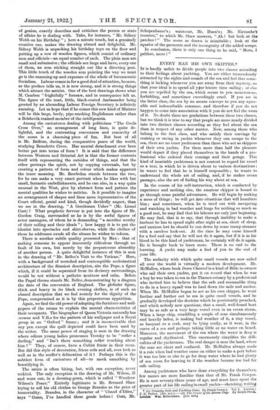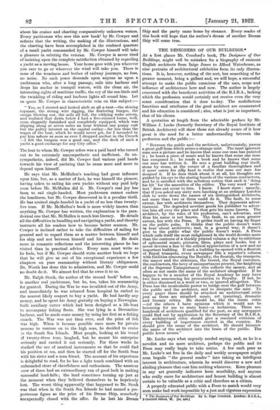EVERY MAN HIS OWN SKIPPER.* IT is hardly unfair to
divide people into two classes according to their feelings about yachting. You are either tremendously attracted by the sights and sounds of the sea and feel that some- thing is lacking whenever you are away from their mystery, so that your ideal is to spend all plur leisure time sailing ; or else you are repelled by the sea, which seems to you monotonous, forbidding, and sometimes exceedingly cruel. If you are in the latter class, the sea by no means conveys to you any agree- able and indescribable romance, and therefore if you do not happen to come into association with it you do not feel the want of it. No doubt there are gradations between these two classes, but we think it is true to say that people are more nearly divided into two distinct classes according as they feel about the sea than in respect of any other matter. Now, among those who belong to the first class, and who satisfy their cravings by cruising or racing in yachts whenever they can escape to the sea, there are no truer yachtsmen than those who act as skippers of their own yachts. For them more than half the pleasure would depart if they placed themselves in the hands of a pro- fessional who ordered their comings and their goings. This kind of insatiable yachtsman is not content to regard his vessel as a taxi, in which he is driven about to various destinations ; he wants to feel that he is himself responsible ; he wants to understand the whole art of sailing, and, if he makes ocean passages, also the art of finding his way about at sea.
In the course of his self-instruction, which is conducted by experience and nothing else, the amateur skipper is bound to go through some painful adventures. He will begin by making a mess of things ; he will get into situations that will humiliate him ; and sometimes, when he is tired out with navigating and watching in bad weather and longs for nothing so much as a good rest, he may find that his labours are only just beginning. He may find, that is to say, that through inability to make a harbour he has to spend night after night at sea, short of sleep, and anxious lest he should be run down by some tramp steamer with a careless look-out. At the time he may curse himself for a fool and say that he will not do it again, but if it is in his blood to be this kind of yachtsman, he certainly will do it again. He is brought back to learn more. There is no end to the learning. A yacht may make a fool of you to the end of your life.
The audacity with which quite small vessels are now sailed all over the world is virtually a modern development. Mr. McMullen, whose book Down Channel is a kind of Bible to owners who sail their own yachts, put it on record that when he was a boy he was taken to sea in the Thames estuary by a professional who invited him to believe that the safe and seamanlike thing to do in a heavy squall was to haul down the sails and anchor. When Mr. McMullen began to act as his own skipper, he went further and further out to sea in quite small vessels, and he gradually developed the doctrine which he persistently preached, and which nobody now questions, that a small, well-found boat may be as safe as a very large vessel even in an ocean storm. When a large ship, straddling a couple of seas simultaneously and heavily laden, is making bad weather of it, a tiny vessel, as buoyant as a cork, may be lying cosily, as it were, in the curve of a sea and perhaps taking little or no water on board. Moreover, the movement of the sea where the water is deep is regular and rhythmical. This enormously simplifies the diffi- culties of the yachtsman. The real danger is near the land, where the seas are short and confused. Mr. McMullen always made it a rule when bad weather came on either to make a port before it was too late or else to go for deep water where he had plenty of sea room for heaving to if the weather became too bad for safe sailing.
Among yachtsmen who have done everything for themselves, few names are more familiar than that of Mr. Frank Cowper. He is now seventy-three years of age, and must have spent the greater part of his life sailing in small yachts—sketching, writing
• (1) Cruising Sails and Yachting Tales. By Prank Cowper. Vol. L_ Loladoo : J. D. Potter. (20s. net.]—(2) The Cruise of the Dream Skip. By RAIPII
Louden Wm. Heinemann. ass. net.]
about his cruises and charting comparatively unknown waters. Every yachtsman who sees this new books by Mr. Cowper and reflects that the writing, the making of the illustrations, and the charting have been accomplished in the confined quarters of a small yacht commanded by Mr. Cowper himself will take a pleasure in saluting the veteran. Mr. Cowper is never tired of insisting upon the complete satisfaction obtained by regarding a yacht as .a moving house. Your home goes with you wherever you care to go or wherever the wind will take you. There is none of the weariness and bother of railway journeys, no fuss, no noise. No such peace descends upon anyone as upon a yachtsman who, after a long passage, sails into harbour and drops his anchor in tranquil waters, with the clean air, the
interesting sights of maritime traffic, the cry of the sea-birds and the twinkling of riding and harbour lights all round him. Let
us quote Mr. Cowper in characteristic vein on this subject :-
"Yes, as I steered and looked aloft at all a-taut—the shining topmast, the strong wire rigging, the fluttering burgee, the ensign blowing out, the sails all full, the eddying wake astern, and realized that down below I had a five-roomed home, well, even elegantly furnished and completely equipped, which was slipping along at seven miles an hour without one penny cost but the paltry interest on the capital outlay—far less than the wages of the lout, which he would never get, for I intended to put him ashore as soon as ever I dropped anchor in the Crouch —I felt the bargain was a good one, and the deck of such a yacht a good exchange for any City office."
The lout to whom Mr. Cowper refers was a paid hand who turned out to be extremely unsympathetic and inefficient. So un- sympathetic, indeed, did Mr. Cowper find various paid hands towards his view of yaChting that he came more and more to depend upon himself.
He says that Mr. McMullen's teaching had great influence upon him, but, as a matter of fact, he was himself the pioneer, having taken to sailing his own yachts without any paid help even before Mr. McMullen did it. Mr. Cowper's real joy has been to sail single-handed. Most yachtsmen cannot endure the loneliness, but Mr. Cowper discovered in it a peculiar thrill. He has cruised single-handed in a yacht of no less than twenty- five tons. If Mr. McMullen's book is more widely known than anything Mr. Cowper has written, the explanation is the para- doxical one that Mr. McMullen is much less literary. He details all the difficulties in handling and navigating a yacht, and thereby instructs all his readers how to become better seamen. Mr. Cowper is inclined rather to take the difficulties of Sailing for granted and to regard them as a matter between himself and his ship and not between himself and his reader. He deals more in romantic reflections and the interesting places he has visited than in practical advice. Every man must write as he feels, but if Mr. Cowper should write another book we hope that he will give us out of his exceptional experience a few chapters on pure seamanship without literary obliqueness.
Dr. Worth has done this to admiration, and Mr. Cowper could no doubt do it. We almost feel that he owes it to us.
Mr. Ralph Stock, the author of the second books before us, is another real yachtsman, but he, too, takes his seamanship for granted. During the War he was invalided out of the Army, and immediately he was released from hospital he rushed to the nearest likely seaport to buy a yacht. He had hardly any money, and he spent his Army gratuity on buying a Norwegian- built auxiliary cutter which had been designed as a life-boat to accompany fishing fleets. She was lying in a Devonshire harbour, and he made some money by using her first as a fishing smack. The War was not then over, and the price of fish was high. When it became possible once more for private persons to venture on to the high seas, he decided to cruise to the South Sea Islands. Most people, looking at his vessel of twenty-three tons, laughed, but he meant his enterprise seriously and carried it out seriously. For three weeks he studied the use of nautical instruments so that he could find his position at sea, and then he started off for the South Seas with his sister and a man friend. The account of his experience is delightful to read, for he has a light touch combined with an unbounded store of cheerfulness and enthusiasm. The amateur crew of three had an extraordinary run of good luck in making successful land-falls ; the land sometimes turning up just at the moment when they believed themselves to be hopelessly lost. The worst thing apparently that happened to Mr. Stock was that when in the South Sea Islands he had named a pre- posterous figure as the price of his Dream Ship, somebody unexpectedly dosed with the offer. So he lost his Dream Ship and the party came home by steamer. Every reader of this • book will hope that the author's dream of another Dream Ship will come true.



































 Previous page
Previous page